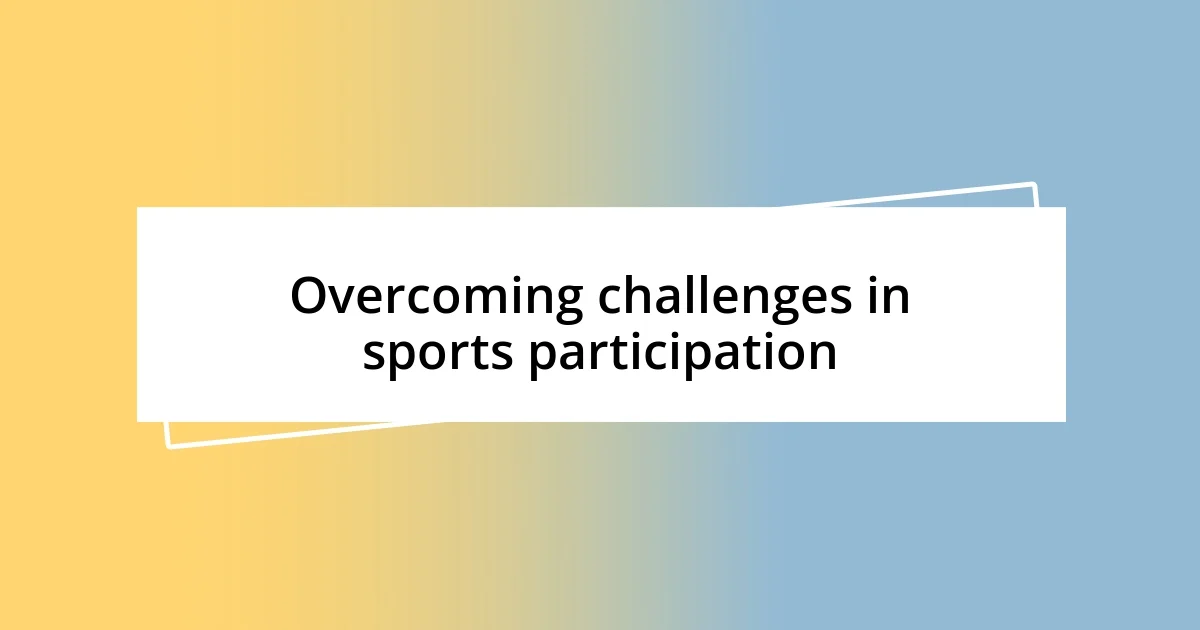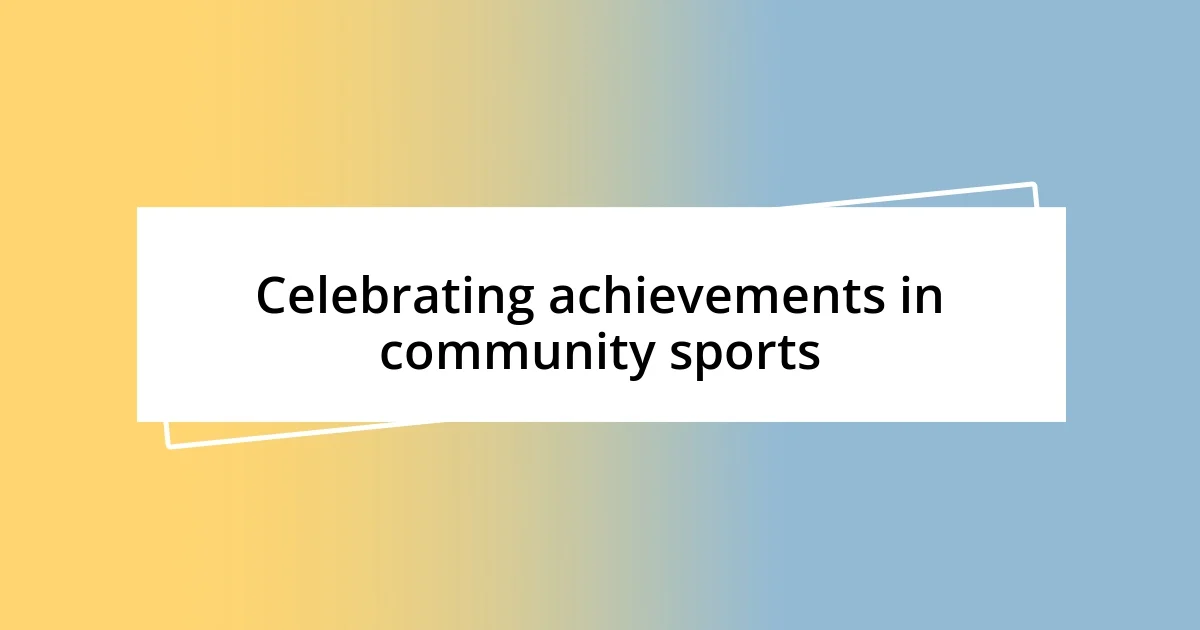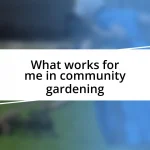Key takeaways:
- Community sports enhance physical fitness, mental well-being, and social connections through shared experiences and teamwork.
- Setting achievable sports goals using the SMART criteria and tracking progress fosters motivation and personal growth.
- Celebrating achievements and recognizing contributions strengthens community bonds and creates lasting memories in sports.

Understanding community sports benefits
Community sports offer a unique blend of physical activity and social connection, which I believe is often underestimated. When I participated in my local soccer league, I not only improved my fitness but also forged friendships that enriched my life. Have you ever felt that rush of camaraderie after a game? That shared experience can actually boost your mood and create lasting bonds.
Engaging in community sports promotes mental well-being, too. I remember a time when I was feeling particularly overwhelmed with life. Joining a weekend basketball game provided me with an outlet to channel my frustrations and feel renewed. It’s fascinating how running up and down the court can clear your head, isn’t it?
Moreover, community sports encourage inclusivity and foster a sense of belonging. One memorable experience for me was coaching a youth team; watching those kids grow both in skill and confidence was incredibly rewarding. How wonderful is it to see someone blossom through teamwork? These experiences not only shape individuals but also strengthen the fabric of our communities.

Building social connections in sports
Building social connections through community sports can be incredibly rewarding. I cannot emphasize enough the joy I felt after my first community volleyball match. The laughter, the shared high-fives, and the way we strategized as a team created an instant bond. Those connections transformed casual acquaintances into supportive friends who cheered me on both on and off the court. It’s remarkable how a simple game can break down barriers and foster new relationships.
Here are a few ways community sports can help build those vital social connections:
- Teamwork: Collaborating with others towards a common goal encourages bonding.
- Shared Experiences: Overcoming challenges together, like a tough game, creates lasting memories.
- Inclusivity: Engaging with a diverse group allows you to meet people from different backgrounds.
- Recurrent Interactions: Regular practices and games lay the groundwork for deeper friendships.
- Personal Growth: Watching each other improve fosters a sense of camaraderie and mutual encouragement.
These elements not only enhance the sporting experience but also enrich our lives by creating friendships that can last a lifetime.

Setting achievable sports goals
Setting achievable sports goals is crucial for personal satisfaction and ongoing motivation. From my experience, it’s important to start small and build progressively. I once set out to run a half marathon without having run consistently before. Let me tell you, breaking that massive goal into smaller milestones—like running a mile, then five, and finally ten—made all the difference. It felt so rewarding to celebrate each little victory instead of feeling overwhelmed by the end goal.
When setting goals, I emphasize the SMART criteria: Specific, Measurable, Achievable, Relevant, and Time-bound. This structured approach keeps me focused and accountable. For instance, rather than saying, “I want to get better at basketball,” I would frame it as, “I want to improve my three-point shooting by practicing three times a week for the next month.” It’s amazing how much clarity this brings to my training.
Lastly, I really believe in tracking progress. I remember keeping a journal of my workouts and achievements during a local soccer season. Being able to look back at my growth not only motivated me but also showed me the effort I was putting in was paying off. Have you considered how tracking your progress might impact your journey in sports? I find that seeing tangible results helps maintain my enthusiasm and commitment in ways I never expected.
| Goal Type | Example |
|---|---|
| Short-Term | Run 1 mile without stopping |
| Medium-Term | Complete a 5K in three months |
| Long-Term | Participate in a half marathon next year |

Developing a consistent sports schedule
Creating a consistent sports schedule has been pivotal in my athletic journey. I remember when I first started playing rugby; the thrill of new friendships was matched only by the chaos of trying to fit practices into my busy life. It wasn’t until I set aside specific times each week purely for training that I truly began to see improvement. Have you ever felt that sense of progress sink in after sticking to a routine? It’s a powerful feeling.
One effective approach I’ve found is to align my sports schedule with my daily routine. For example, I opted for morning training sessions, just after sunrise, which injected energy into my entire day. I discovered that dedicating those early hours to my sport helped foster a sense of discipline—keeping me awake during work and sharper during games. I also make it a habit to plan my social activities around these sessions. This not only keeps my commitments manageable but also reinforces the importance of my athletic goals.
The key, for me, has been flexibility. Life can throw curveballs—unexpected work meetings or family obligations—but I always build in backup days for practice. This means I avoid feeling guilty if I miss a session and can easily reschedule. Have you considered how a little flexibility could support your consistency? Adapting to life’s demands while maintaining my commitment has made my sports journey even more enjoyable, and I think it could enhance yours, too.

Overcoming challenges in sports participation
Overcoming challenges in sports participation is something I’ve navigated through firsthand. I remember facing self-doubt when I joined a community swim team as an adult. Standing at the edge of the pool, I felt a wave of anxiety wash over me. What if I wasn’t good enough? But I quickly learned that everyone was there for the same reason: to improve and enjoy the experience together. That realization transformed my fear into motivation; suddenly, I was focused on progress and camaraderie instead of comparison.
Another hurdle I encountered was time management. As a busy professional, finding a balance between work, family, and sports felt impossible at times. I found it helpful to prioritize my sports commitments by treating them as important appointments on my calendar. I remember carving out time during my lunch breaks to squeeze in gym sessions. It taught me the value of being intentional with my time. Have you ever felt like you had to sacrifice something to make room for your passion? I learned that investing time in activities I loved ultimately enhanced my well-being and productivity.
Lastly, I’ve faced physical obstacles, like dealing with injuries. When I sprained my ankle during a basketball game, I thought my season was over. But I turned that challenge into an opportunity to focus on my upper body strength and conditioning. During physical therapy, I realized how resilience plays a significant role in sports. Every setback became a stepping stone, and I’ve since gained a deeper appreciation for my body’s capabilities. How do you respond when faced with limitations? I believe that embracing challenges can lead to growth and newfound strengths that you never knew you had.

Celebrating achievements in community sports
Celebrating achievements in community sports is something that brings a unique sense of joy and belonging. I recall the excitement of our local marathon, where seeing fellow participants cross the finish line felt like a shared victory, regardless of race time. It struck me how each personal best was celebrated with thunderous applause, reminding me that every milestone, big or small, matters in our tight-knit community.
One unforgettable moment happened when we hosted a youth soccer tournament. Watching the smiles on the kids’ faces as they received their medals was heartwarming. It wasn’t just about winning; it was about the teamwork and friendships forged along the way. I often wonder: how many of those kids will carry that feeling of accomplishment into their adult lives? Celebrating achievements, in my view, is about creating memories that foster a lifelong love for sports.
Recognizing contributions also plays a vital role in our community celebrations. I vividly remember the annual awards night where every athlete received personal shout-outs. It felt rewarding not just for the recipients but for everyone involved, as each story shared reinforced our collective passion. Have you ever been part of a celebration that made you feel seen and valued? Those moments, where we uplift each other, create a powerful sense of unity, making our community sports experience even more enriching.














